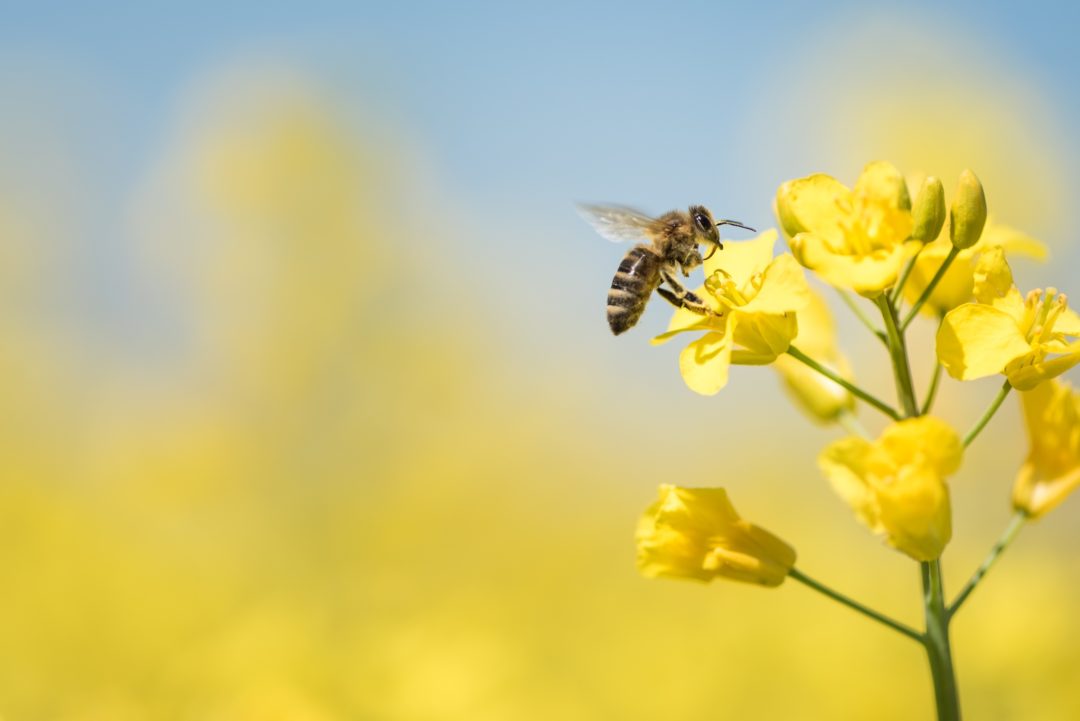
Glyphosate Exposes Honey Bees to Pathogens, New Study Finds

Glyphosate, the active chemical in the pesticide Roundup, functions by blocking an enzyme in the shikimate pathway, which pests have and animals do not. Theoretically, therefore, it is non-toxic.
However, a study conducted by researchers at the University of Texas at Austin, called “Glyphosate perturbs the gut microbiota of honey bees” and published on Sept. 24, points out that many bees have a susceptible version of the enzyme targeted by glyphosate in their gut microbiota. The paper was published in the Proceedings of the National Academy of Sciences.
The honeybee gut microbiota contains eight bacterial species that promote weight gain and reduce pathogen susceptibility. Newly emerged worker bees are nearly free of gut bacteria, which they acquire during their first few days after emergence through social interactions with other workers. Bees that do not have a healthy microbiota show reduced weight gain, increased pathogen susceptibility, and increased mortality.
Researchers Erick Motta, Kasie Raymann, and Nancy Moran collected hundreds of bees from a single hive, treated them with one of two glyphosate levels or sucrose syrup for five days, marked them with paint for easy identification, and returned them to the hive. The two levels of glyphosate with which the bees were treated were chosen to mimic environmental levels.
The researchers were only able to recover fewer than 20% of the bees they reintroduced into the hive; glyphosate in bees has been shown in two separate studies, both published in theJournal of Experimental Biology, to impair spatial processing, compromising their ability to return to their hives. Among those they recovered, several of the eight strains of bacteria were significantly altered.
They then exposed newly emerged bees to glyphosate while the bees were acquiring their microbial communities. After five days, both the bees treated with glyphosate and bees not treated with glyphosate were exposed to an opportunistic pathogen. Those treated with glyphosate exhibited increased mortality.
The researchers demonstrated that glyphosate exposure and the altered microbiota did not, in and of themselves, result in increased mortality.
They repeated their experiments with a different hive, and got similar results.
Bayer, the company that now owns Monsanto and Roundup, released a statement the following day that said, “No large-scale study has ever found a link between glyphosate and honey bee health issues.” The statement goes on to say that the study was not performed under realistic field conditions and that it did not test enough bees.

The editorial team at WholeFoods Magazine has decades of experiences reporting on natural products industry news, trends, and more. This national, monthly business-to-business magazine has been published continuously for nearly 40 years (the magazine was founded in 1977, and has been owned by Wainer Finest Communications since 1984). It is the longest-tenured media outlet of its kind in the natural products industry. The editorial focus at WholeFoods Magazine is, and always has been, on informing and educating members of the natural products industry.
The Magazine
Information
About Us
NOTE: WholeFoods Magazine is a business-to-business publication. Information on this site should not be considered medical advice or a way to diagnose or treat any disease or illness. Always seek the advice of a medical professional before making lifestyle changes, including taking a dietary supplement. The opinions expressed by contributors and experts quoted in articles are not necessarily those of the publisher or editors of WholeFoods.







